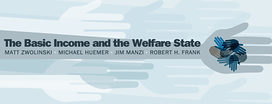Mike Huemer sympathizes ith the core moral claim of Georgism, but he doubts that a Georgist Land Value Tax (LVT) would generate sufficient revenue to fund a BIG. His main concern is that “most of the economic value of land is due to the benefits of living or working in a high-population-density area.” A piece of land in New York City is valuable primarily because there are a lot of other people around with whom the owner can engage in mutually beneficial exchanges. Without those other people around, the land would not be nearly as valuable. But this means that there is a sense in which the main source of land’s value is the productive activity of human beings. And if Georgist moral principles only license the taxation of the unimproved value of land, then most of land’s actual value would appear to be off limits.
I think Mike’s empirical claim about the source of land’s value is correct. And I think it demonstrates an important point about the importance of trade and the division of labor in the development of human prosperity – a point most famously expressed by Adam Smith and beautifully developed by Matt Ridley in his magnificent book The Rational Optimist. However, I don’t think Mike’s point undermines the Georgist defense of a LVT, or my claim that a LVT might suffice to finance a reasonable BIG.
Mike brings up the issue of population density to show that a large part of land’s value depends on the productive activity of other people. But, really, all of land’s economic value depends on the productive activity of other people. Land only has economic value, after all, to the extent that other people are willing and able to pay for it. And the only way other people can put themselves in a position to be willing and able to pay is by producing something themselves.
The same point can be made in a different way with respect to particular aspects of land’s value. Land with subterranean crude oil deposits is valuable primarily because other people have figured out how to put crude oil to productive use. Before that discovery was made, oil was a pollutant, not a resource. The value of a landowner’s oil is thus largely a positive externality created by others’ labor.
So Mike’s point applies more broadly than he gave it credit for. Still, the key question is whether landowners are entitled to the external benefits created by others’ labor, or whether such benefits are the legitimate object of a LVT. The argument I’ve given above shows that the stakes of this question are higher than Mike supposed, but it doesn’t tell us how to answer it.
I think the correct answer must be that, on Georgist principles, the landowner is not entitled to this external benefit. Her ability to capture that benefit depends on putting a fence around a piece of land in order to keep others out. And this, ex hypothesi, is something she has no moral right to do. It’s not benefitting from the positive externalities of others’ labor that’s the problem. It’s the forcibly excluding others from doing so.
This explains why, contra Huemer, people in low-population-density areas are entitled to compensation from people in high-population-density areas. High-population-density land is, ceteris paribus, more valuable than low-population-density land. So when you put a fence around a piece of land in Manhattan, you’re depriving other people of a more valuable resource than you do when you put a fence around a piece of land in West Virginia. Because you have deprived others of a more valuable natural resource, you owe them more in compensation.
But Mike has one more argument up his sleeve. Almost all current landowners purchased their land from someone else. And that purchase price reflected the discounted future value of the then-current land rent. If we instituted a LVT tomorrow, we would wind up taxing landowners on rents that they had already paid for. This seems wrong to Mike. It would only be fair, he suggests, to tax them on the rents that accrue to their property after their purchase. For it is only those rents that constitute a real windfall to the owner.
Mike has identified a real problem here. But it is not by any means a problem that is unique to Georgism. It is a problem that besets any theory that specifies an ideal of justice in conflict with the status quo. Suppose you think, like I do, that the medallion system that cartelizes the taxi industry is unjust. What should be done about it? Taxi drivers did, after all, pay for their medallions. So if we abolish the system, we’ll be depriving them of a resource into which they invested real time and labor. On the other hand, they had no right to that benefit in the first place. So I am more inclined to think that the correct answer is – abolish the cartel as soon as we can. And to those who are harmed by the loss of their monopoly status, we say, “Be grateful you were able to reap monopoly rents for as long as you did. But from now on you can compete for your income like everybody else.”
On Georgist principles, isn’t that the correct response to the landowner, too?

